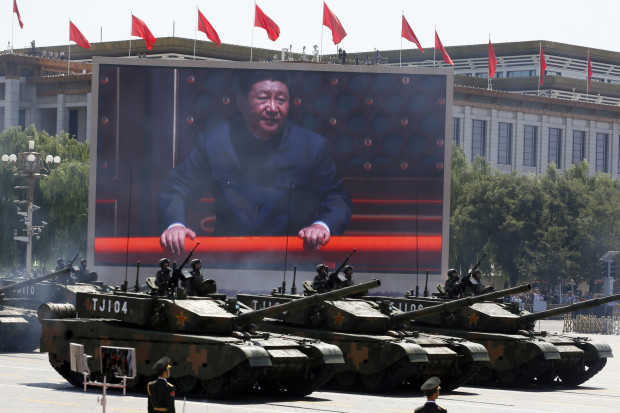China’s Xi takes more direct command over military

In this Sept. 3, 2015 file photo, Chinese President Xi Jinping is displayed on a screen as Type 99A2 Chinese battle tanks take part in a parade commemorating the 70th anniversary of Japan’s surrender during World War II held in front of Tiananmen Gate in Beijing. Chinese President Xi Jinping is assuming a more direct role as commander of the country’s powerful armed forces with the new title of commander in chief of its Joint Operations Command Center. AP
BEIJING, China — Bolstering his status as China’s most powerful leader in decades, Chinese President Xi Jinping has assumed a more direct role as head of the country’s powerful armed forces with the new title of commander in chief of its Joint Operations Command Center, state media and analysts said Thursday.
Xi’s new position was revealed in news reports that featured prominently on national news broadcasts Wednesday and Thursday in which he appeared publicly for the first time in camouflage battle dress wearing the joint center’s insignia.
READ: Amid military buildup, China’s Xi named ‘commander in chief’ | China governor fired for ‘disloyalty’ as Xi tightens grip
During his Wednesday visit, Xi called on its staff to “closely follow the trends of global military revolution and strive to build a joint battle command system that meets the need of fighting and winning an informationized war,” the official Xinhua News Agency said.
Officers should “change their ideas, innovate and tackle difficulties, in a bid to build a joint battle command system that was absolutely loyal, resourceful in fighting, efficient in commanding and courageous and capable of winning wars,” Xinhua quoted Xi as saying.
Battle command capacities should be measured by “the standards of being able to fight and win wars,” Xi said, stressing the need to prepare for conflicts, analyze possible security risks, and handle effectively “all sorts of emergencies.”
The joint center, reportedly located underground in the western outskirts of Beijing, is under the direct supervision of the ruling Communist Party’s Central Military Commission, which is headed by Xi and oversees the 2.3-million-member People’s Liberation Army, the world’s largest standing armed forces.
Xi was accompanied on his visit by the commission’s two vice chairs, Gen. Fan Changlong and Gen. Xu Qiliang.
Among his several other titles, Xi is also leader of the ruling Communist Party and chair of a recently created National Security Council, which gives him greater control over the domestic security services.
As head of the military, Xi has overseen a reorganization of the PLA’s command structure into five theater commands aimed at better integrating the different services. He has ordered a 300,000-person reduction in forces that will see the elimination of many outdated and non-combat units, and shift the emphasis further from ground forces to the navy, air force and missile corps.
Xi’s appearance in battle dress with insignia Wednesday emphasized his more direct role in military affairs. When appearing simply as head of the Central Military Commission he routinely wears olive green tunics, shirts and trousers without insignia or decoration.
Three years since taking on the presidency, Xi is widely seen as having accumulated more power and authority than any Chinese leader since Deng Xiaoping in the late 1980s. A cult of personality has also sprung up around him to rival that of the founder of the communist state, Mao Zedong, with his slogans, sayings and signature political themes widely disseminated in the media.
Yet his reputation has also been called into question by anonymous letters, allegedly from Communist Party members, calling for his resignation. Revelations in the international media about vast wealth accumulated by members of his extended family have also flown in the face of his relentless campaign against corruption in the party, military and state industries.
Xi’s new title and his visit to the joint center were “more political than military” in significance and don’t imply he will take charge of the day-to-day running of the PLA, said Andrei Chang, Hong Kong-based editor of the magazine Kanwa Asian Defense and a close observer of Chinese military affairs.
“Throughout Chinese history, political power has always been founded on control of the military,” Chang said. “This was a visit to show off his muscle to his potential enemies and show that he is tough and in charge.”
Along with his structural reforms, Xi has highlighted the PLA’s importance with frequent, highly publicized visits to military bases and a massive parade last September that saw the army’s latest equipment wheeled through the center of Beijing while warplanes and helicopters roared overhead.
Xi has also pursued assertive policies in the disputed South China Sea to construct island airfields on former coral reefs and limit the U.S. Navy’s ability to operate in the area.
That has raised tensions with China’s Southeast Asian neighbors and prompted the U.S. to devote more resources to Asia and strengthen its cooperation with traditional allies and even former foe Vietnam.